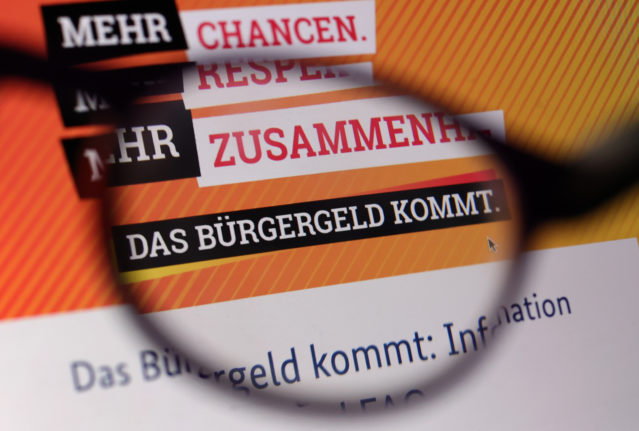More language and integration courses
Language and integration courses are now also open to asylum seekers who are not yet sure if they will stay in Germany for the long term – but only if they entered the country before August 1st, 2019. In addition, the language courses will also be open to other foreigners who were previously excluded from them.
More school support for low-income children
Children from low-income families will receive more financial benefits starting on August 1st, thanks to the new “Strong Family Law”. It will apply to parents who earn less than €2,000 brutto (before tax).
Among the changes, parents will no longer have to pay their own share for school lunches or for transport to school. The “school start package” (Schulstarterpaket) which they receive for new books and supplies will also be increased from €100 to €150. In addition, children in need of tutoring will receive additional financial support.
The law, for which Germany’s Cabinet is setting aside €1.5 billion in the next three years, will affect the four million children in Germany who live in “financially difficult situations,” writes the Berliner Morgenpost.
Some Kita parents freed from fees

A teacher reading to students at a Kita in Dresden. Photo: DPA
As of August 1st, not only parents who receive social benefits are exempt from daycare fees, as was previously the case. Under a new “Good Kita Law”, anyone who receives a child allowance (Kindergeld) or housing allowance (Wohngeld) may also send their children to care free of charge.
According to the Federal Ministry for Family Affairs, 1.2 million children can benefit from daycare time that will not cost their parents anything.
SEE ALSO: Explained: How each German state plans to improve child care and lower Kita costs for families
More financial support for students
Through Germany’s BAföG (Federal Law for Support in Education), high school students and university students who no longer live at home will receive up to €861 per month to assist with their students and living costs, up from a previous maximum of €735. For living costs alone, the students can receive up to €325 , up from the previous amount of €250.
The Azubi advantage
Not only school students, but also those doing their training, or Ausbildung, qualify for grants from Germany’s Bundesagentur für Arbeit (Job Centre) if they live outside their parents’ home.
The maximum amount for the Auszubildende, or Azubis as they are commonly called in German, will be increasing from €622 to €716 monthly, and is slated to increase by an additional seven euros in 2020.
A significant price slash to student transport tickets

Students are among the many commuters who regularly use Berlin's public transport. Photo: DPA
Starting on August 1st, several German states such as Hamburg will begin offering a so-called Azubi ticket, in which students in the midst of their Ausbildung can ride public transport for a subsidized cost.
North Rhine-Westphalia, Saxony and Berlin already offer such a ticket – and at the start of the month, Berlin is taking it a step further and letting all students ride the bus and Bahn (U-Bahn and S-Bahn) completely free within the AB zone.
Bundeswehr boost
Germany’s armed forces, or Bundeswehr, will be seeing a big change come August 1st when the “Act to Sustainably Strengthen Operational Readiness” enters into force. The aim is to make it easier for regular soldiers to enter civilian working life by promoting internships and career counselling. In addition, relatives of soldiers injured during deployment will be able to receive therapy free-of-charge.
SEE ALSO: More women soldiers and less equipment: A look at Germany's army in numbers
A more digitalized DHL
Customers of German postal service DHL will see the pick-up procedure change come August 9th. From this date, the so-called mTan numbers will no longer be sent by SMS, but rather through the DHL package app. The numbers are required, along with a customer card, to open the compartments with the parcels.
SEE ALSO: DHL to offer customers in Germany 'exact' package delivery times
Renting electric scooters for the long(er) haul

E-scooters are becoming increasingly popular in Germany. Photo: DPA
Starting August 1st, Otto Now will join the ranks of German companies offering e-scooter rentals nationwide – with a monthly rental price.
The monthly fee marks an alternative to the usual e-scooter rental system, in which the scooters are “unlocked” on the street to be used only for a specific amount of time – with the renter billed per minute through an app. These e-scooters will remain with the user for a monthly rent of €39, including insurance.
The vehicles are set to have a limit of 40 kilometres and the battery can be recharged in a maximum of six hours.
SEE ALSO: Improve cycling infrastructure: Can Germany cope with electric scooters?
Calling all German football fans
The new Bundesliga season starts on August 16th, and there will be new, albeit more expensive, streaming options that come with it. Games that were previously streamed on the network Eurosport will now be taken over by DAZN, and at a higher cost depending on the type of subscription. Most Bundesliga games, however, will continue to be streamed by the online network Sky.
This change stinks for some
Starting on August 23rd, several scents will no longer be allowed in perfumes if they are deemed to cause allergies. This list of chemicals, applicable to all EU countries, is available in English here.




 Please whitelist us to continue reading.
Please whitelist us to continue reading.
Member comments